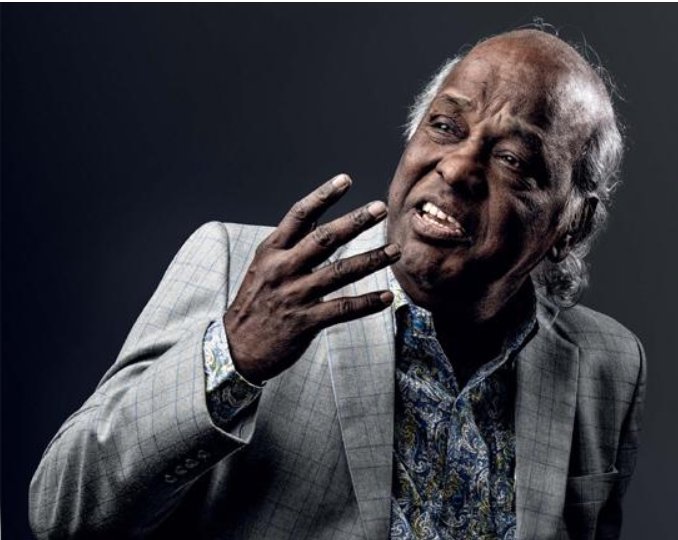Rahat Indori: The Stout-hearted Poet of The Common Folks

The famous Indian poet Rahat Indori has unfortunately left the world due to a heart attack in a hospital in Indore. He was 70 years old.
A former professor of Urdu language, National Award-winning lyricist and the soul of poetry gatherings, Indori, who took his name from the city of Indore he lived and died in, breathed his last a day after testing positive for COVID-19.
Indori was given a final farewell by some of his family members and close people and buried in a cemetery in the city. In a statement released Tuesday night by Sri Aurobindo Institute of Medical Sciences (SAMS), "Indori had a heart attack at one o'clock this afternoon. He was saved from this. But after two hours, he again suffered a heart attack and died at five in the evening."
The statement said, "Up to 60 per cent of pneumonia had taken over both his lungs. Therefore, they were placed on the artificial respiratory system. He was also given high-level antibiotics and antiviral drugs." The hospital said in a statement that Indori was already battling chronic diseases of the heart and kidney along with diabetes and high blood pressure. He arrived on Monday (August 10) evening.
The poet, who described himself as “poet, painter, Bollywood lyricist”, in his Twitter account had posted at 7.35 on Tuesday morning (August 11) informing his followers that he had tested positive for COVID-19 after developing “initial symptoms”. He was hopeful of pulling through and had sought prayers from his followers, adding that he would keep everyone updated through social media.
Earlier, Indore District Magistrate Manish Singh told, "Indori, infected with Covid-19, died while undergoing treatment at Aurobindo Institute of Medical Sciences (SAMS)." Ravi Dosi said, "Indori had pneumonia in both lungs and was brought to the hospital in critical condition."
"Due to difficulty in breathing, he was kept in ICU and given oxygen, but despite all the efforts, we could not save his life," he said.
Indori's son and young poet Sutlej Rahat had told on Tuesday morning before his father's death, “My father was at home for the last four and a half months due to the outbreak of Covid-19. He was only getting out of the house for his regular health check-up.” He said that Indori had been feeling restless for the last five days and confirmed pneumonia when an X-ray of his lungs was done on the advice of doctors. Later in the investigation, he was found infected with the coronavirus.
A Painter turned Professor, Poet and then Hindi film Lyricist, Rahat Indori was a pedagogist of Urdu literature in Indore University before his flair was spotted by Mumbai's film industry and the listeners of Urdu poetry across the World. A thorough gentleman, with philosophic inclinations, Rahat Indori is known for his poetic brilliance and absolute commitment to work.
A vocal critic of the Narendra Modi government’s Citizenship Amendment Act (CAA) and National Register of Citizens (NRC), the poet’s ‘shayari’ had become an inspiration for the countrywide protests against the anti-constitutional law that discriminates against Muslims. He had also participated in ‘mushairas’ critiquing the government on these two laws with his sharp, emotive lines.
People close to Indori say that in the last few years, he had been continuously giving stage shows all over the world and due to these tours, he could hardly stay in the hometown. However, due to the outbreak of Covid-19, he was forced to stay in his house in Indore, which is among the most affected districts in the country for the last four and a half months.
Rahat Indori was famous for his poetry as well as for his songs in films. Songs like 'Dekh Le' in 'Munna Bhai MBBS', 'Tumsa Koi Pyara' in 'Khudadar' starring Govinda, 'Chori Chori Jab Nazre Mili' in 'Kareeb' and 'Neend Churai Meri' in Ishq were penned by him. Lyricist and Censor Board President Prasoon Joshi said that Indori was a different style of poet.
From a live performer swinging a mushaira like a rock star-laced with an overload of attitude, he has shifted shape. His critics point to his antics in live performances, putting his popularity down to his playing to the gallery; but popularity is not a measure of greatness, they say. Even among such people, says Indore-based Hindi editor Prakash Purohit, one finds those who acknowledge that his written work has more depth than his live readings.
In terms of poetic calibre, Aalok Shrivastav, a younger Urdu poet, compares him with the calmer, old-world poets Wasim Barelvi and Bashir Badr. The latter two possess the same persona in their writing, in live recitation and in their film lyrics. Indori is three different people in three different spheres.
Among his closest friends and promoters is Hindi poet Kumar Vishwas, exactly 20 years younger. He has seen Indori evolve in three phases over the past 25 years-first, as an Urdu academic; second, as a somewhat popular but infamous live performer; and third, as a "shayar-e-azam of international repute".
His fame was built on a certain indifference to the establishment, not just the power establishment but also the Urdu literary establishment.
Vishwas started as an outlier in the world of Hindi poetry, charting his own course, creating a niche in a younger audience. He has 5.4 million Twitter followers. In Indori, he found an experienced star performer and friend. It was on Vishwas's insistence that Indori's son began managing his father's online footprint, creating his brand. His other son, Sutlej, has diverged from his journalism career to attend to his ageing father's health, accompanying him to mushairas across the country.
Vishwas calls Indori a delightful travel companion, full of anecdotes of the shenanigans of famous literary characters of the past.
Indori is frequently compared to Dushyant Kumar, who died in 1975 at the age of 42. Dushyant wasn't accepted by the literary establishment but was quite popular for his revolutionary ideas. Somewhat similarly, Indori is also called India's Jaun Elia, a Pakistani poet.
Nirupam calls Indori a rare example of bravery in criticising the shifting political mood over the past five years since the Bharatiya Janata Party came to power in 2014. There are others who say that he goes too far in his criticism, playing into communal stereotypes resulting from recent religious polarisation. He gets trolled online for confronting Hindutva, but those who know him say he is not religious at all, that his concerns are social, rather than communal.
Anybody familiar with his work talks about his attitude, about his seething anger and how he can shift effortlessly from anger to a romantic mood. His is a distinctive voice and, Vishwas says, his verse is recognisable by its style, which cannot be said for too many poets. Everything else aside, says Purohit, he has taken Urdu to the masses. Shrivastav says no Urdu poet today can sway a mushaira crowd like him.
Numerous young people find their voice in his lines. He is also accused of populism, of using sexual innuendo and an overtly dramatized delivery designed to appeal to his younger audience. Those are risks that come with the territory. In his live recitations, Indori often asks the audience to pay close attention because "sometimes he reads a good couplet".
Udayan Vajpayee, writer and editor of the literary journal Samas, says the Urdu tradition has emphasised questioning oneself; those timeless works begins with self-confrontation before facing up to the world. That's what he would like to see in Indori's verse.
The lyricism of his lines and passion for his country knows no bounds.
Rahat Indori wanted India of his dreams, where peace and love prevails. One where truth and honesty reigns. This is the idea of India that the well-known poet and painter shared in an interview, where he discussed his views on a range of topics from politics and democracy to art and culture. His penned lines are now all the more relevant in the present times of bigotry, communal divide and masculine majoritarianism.
We wish for his soul to rest in absolute peace and pay tribute with these powerful lines of his:
“Sabhi ka Khoon Shamil Hai is Mitti Mein,
Kisi ke Baap Ka Hindustan Thodi Hai.”















































